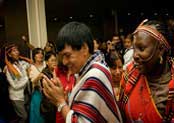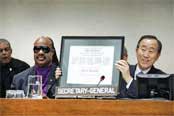
The state of the global economy is slowly beginning to improve with the support of massive fiscal stimuli, but the recovery is uneven across regions and conditions for sustained growth remain fragile. Uncertainties and risks still exist, as well as policy challenges, which need to be addressed.
The global economic landscape has begun to show signs of improvement. Since the second quarter of 2009, global equity markets have rebounded, risk premiums on lending have fallen and international trade and global industrial production have noticeably recovered. An increasing number of countries are starting to register positive quarterly growth of gross domestic product (GDP).
According to the World Economic Situation and Prospects (WESP) 2010, to be launched worldwide in the 3rd week of January, a mild growth of 2.4 per cent in the baseline scenario is expected for the global economy in 2010, compared with a rate of 7 per cent below where it might have been if pre-crisis growth had continued.
However, the speed of recovery is uneven among different economies: although still below their potential growth, developing countries, especially those in Asia, are expected to show the strongest growth in 2010, led by the economies of China and India, which are expected to grow at 8.8 and 6.5 per cent respectively. Meanwhile, the Russian economy, which is leading the turnaround among economies in transition, is expected to grow at 1.5 per cent in 2010 after a severe decline by 7 per cent in 2009.
Compared with developing economies, the major developed economies are not expected to provide a strong pull to global growth in the near future. The United States is expected to grow by 2.1 per cent in 2010, following an estimated downturn of 2.5 per cent in 2009, while the European Union and Japan will see a much weaker recovery, with GDP growth of no more than 0.6 and 0.9 per cent respectively.
But the circumstances for sustained growth remain fragile. Credit conditions are still tight in major developed economies, the rebound in domestic demand remains tentative at best in many economies and is far from self-sustaining, and high unemployment rates and the large output gap in most countries continue to pose challenges for policy makers worldwide. Further, the global macroeconomic imbalances could widen again to form a source of renewed financial instability.
Sustainable global rebalancing
Continued fiscal stimulus will be necessary to keep up global aggregate demand, amidst further pressures on financial institutions to cleanse their balance sheets and restore lending capacity. For policymakers, the immediate challenge will be to determine how much longer the fiscal stimulus should continue. Given the risk of a double-dip recession resulting from premature withdrawal, the stimulus should continue at least until there are clearer signals of a more robust recovery. Although it is difficult to establish when and where the recovery has become robust, substantial improvements in employment conditions and reduction of output gaps will likely be meaningful indicators for establishing the turning point.
Three forms of rebalancing of the global economy would need to take place over time, in order to avoid a return to the unsustainable pattern of growth that led to the global crisis in the first place. First, the pressure on Governments to buoy global demand would need to diminish gradually through renewed impulses from private demand. Second, the composition of aggregate demand would need to be rebalanced to lend greater weight to investment in support of future productivity growth, and especially to initiate the transformative investments needed to meet the challenge of climate change. Third, demand across countries will need to be rebalanced, which would involve a shift towards external demand (net exports) in major deficit countries, such as the United States and a few others, and towards domestic demand in the major surplus countries, especially those in Asia.
Close policy coordination is required to achieve these three rebalancing acts, since they are strongly interdependent. Consumer demand in the United States, as one of the key drivers of pre-crisis growth, is expected to remain sluggish in the outlook, making a rebalancing across countries necessary. From the perspective of global imbalances, it would also be undesirable to have to rely again on this source of growth for the recovery. Public and private investment to address climate change can also be an integral part of the rebalancing efforts.
Strengthening policy coordination
The framework for “strong, sustainable and balanced growth” launched by the G20 leaders at the Pittsburgh Summit could prove an important step in the right direction. As part of this framework, G20 members with significant external deficits (mainly the United States) have pledged to undertake policies to support private savings and undertake fiscal consolidation while maintaining open markets and strengthening export sectors.
As elaborated in detail in the World Economic Situation and Prospects 2007, a successful framework for international macroeconomic policy coordination should consist of at least four components: developing a consensus on common goals through international consultations with outside mediation, addressing commitment problems by issuing multi-year schedules for policy adjustments, enhancing the context for mediation and the perceived legitimacy of the mediator, and initiating systemic reforms in the field of international monetary and financial affairs.
To strengthen global governance, further progress is needed on four fronts: extension of multilateral surveillance by the IMF well beyond the traditional emphasis on exchange rates, to address broader macro-financial surveillance and to monitor the “sustainable rebalancing” process of the global economy as outlined; more pervasive progress on governance reform of the IMF to add legitimacy to the institution’s enhanced role in this respect and also for mediating multi-annual agreements; strengthening accountability through clear and verifiable targets for desired policy outcomes, including a mechanism for penalizing non-compliance; and close coordination with other areas of global governance, including those related to development financing and the multilateral trading system, and the United Nations Framework Convention on Climate Change.
Reforming the global reserve system
The present global reserve system, which uses the United States dollar as its major reserve currency, suffers from a number of systemic flaws that have been well documented since its creation. The key deficiencies could be addressed by either evolving the present reserve system into a full multi-currency reserve system or, preferably, by moving to a reserve system based on SDRs.
Policy actions will make the difference
The effectiveness with which policy makers address these three challenges will ultimately determine whether the global economy will recover or once again slide into recession.
WESP 2010 provides in-depth analysis of policy responses from governments and financial institutions. This and further analysis and forecasts are backed up by detailed macroeconomic statistics.
More information on WESP.

More than 370 million indigenous people live on this planet. Among them, each group has its own distinct culture and identity, which are formed and developed on the land where they have been living and struggling through generations.
Indigenous peoples are the aboriginal residents of Mother Earth. From the Arctic cold to the tropical heat, they can be found in every inhabited climate zone. They speak around 5,000 languages and numbering more than 370 million, they make up 6 percent of the world’s population.
Throughout history, indigenous peoples have suffered from invasions, conquests, marginalization and assimilation. Their lands have been usurped, their natural resources excavated, their cultures subordinated, their identities destroyed, and their rights as human beings violated. Today, they are facing issues such as losing their traditional lands and languages. However, working together with the United Nations, indigenous people are finding their own way towards a self-determined development.
“Our roots are deep in the lands where we live. We have a great love for our country, for our birthplace is here. The soil is rich from the bones of thousands of generations. Each of us was created in these lands and it is our duty to take great care of them, because from these lands will spring the future generations of our peoples. We walk about with great respect, for the Earth is a very Sacred Place”.
Sioux, Navajo, and Iroquois Declaration
Becoming the agent of a development with culture and identity
Many times in history, indigenous people have been treated as either “primitives” or “savages” who needed to be civilized and assimilated, or were seen as obstacles in the way of economic development because the land they occupied was often rich in resources.
Indigenous people have suffered when countries have forced them to assimilate to a dominant cultural context. Models of development that continue to follow assimilationist policies have further alienated indigenous peoples, generating further poverty and a myriad of social inequalities. Today, there are plenty of testimonials about the negative impacts of development or models of development where indigenous peoples might have achieved certain western standards of living, but now experience the loss of identity and cultural impoverishment.
From the views of indigenous peoples, development should take an approach which prioritizes the preservation of their culture and identity, by respecting their aspirations, values, their way of life and their uniqueness. Indigenous peoples want to become agents of their own development and have the foresight to promote a development paradigm that is self-determining. This corresponds to recently-evolved conceptions towards development in the international community: “human development”, “sustainable development” and “human-rights based approach to development”. This development paradigm includes economic growth, sustainable development of the environment and affirmation of the social, economic and cultural rights of indigenous peoples.
In today’s rapidly transforming societies, it is crucial that indigenous peoples’ vision of development be explored and given further consideration. While important issues such as sovereignty, self-government and self-determination are core values in the Western world, they are seldom contemplated in relation to indigenous peoples. However, the United Nations Declaration on the Rights of Indigenous Peoples provides a strong basis from which indigenous peoples can affirm their rights and define their aspirations in the debates with states and corporations around development with culture and identity.
Certainly, Articles 3 and 32 of the United Nations Declaration on the Rights of Indigenous Peoples (which was adopted in 2007) affirm their right to self-determination and the right to determine and develop priorities and strategies for development.
Working together with the Untied Nations
Significant changes began to take place in 1923, when Haudenosaunee Chief Deskaheh travelled to Geneva to speak to the League of Nations, to defend the right of his people to live under their own laws, on their own land and under their own faith. This historic event inspired those in generations to come to try and improve the status of indigenous people.
A similar journey was made by Maori religious leader T.W. Ratana. Ratana believed that the Treaty of Waitangi (which was brokered between Maoris and white settlers in New Zealand in 1840 and gave Maori ownership of their lands) had been broken. Ratana first traveled to London with a large delegation to petition King George, but was denied access. He then sent part of his delegation to Geneva to the League of Nations and arrived there later himself, in 1925, but was also denied access.
In 1982, the Working Group on Indigenous Populations (WGIP) of the Sub-Commission on the Promotion and Protection of Human Rights was established by a decision of the United Nations Economic and Social Council.
On 13 September, 2007, the Declaration on the Rights of Indigenous Peoples was adopted by the General Assembly. It is the most comprehensive statement of the rights of indigenous peoples ever developed. It was highlighted as the overarching framework for development regarding indigenous peoples’ issues with the right to self-determination being the key to debates on development. The UNESCO Universal Declaration on Cultural Diversity gives attention to the linkages between culture, development and identity.
The work of committed international bodies combined with the active involvement and lobbying by indigenous peoples within the United Nations system has resulted in the creation of several UN entities that address indigenous peoples’ issues, such as the UN Permanent Forum on Indigenous, the UN Special Rapporteur on the Situation of Human Rights and Fundamental Freedoms of Indigenous Peoples, Expert Mechanism on the Rights of Indigenous Peoples of the UN Human Rights Council, as well as the increasing use of UN Treaty Bodies to raise complaints against States.
Indigenous peoples have also expanded lobbying and advocacy efforts and constructive engagements to other UN bodies, such as the International Labor Organization, the World Bank, the UN Development Programme and the UN Development Group, and bodies dealing with the protection of traditional knowledge, traditional cultural expressions, cultural heritage, etc.
Lobbying and advocacy at a national level has likewise resulted in important developments for indigenous peoples in enactments of constitutional provisions and national laws that recognize indigenous peoples’ rights, gaining political power, establishment of indigenous autonomous regional governments, increasing networking at national, regional and global levels.
United Nations International Expert Group Meeting this January
Recommended by the United Nations Permanent Forum on Indigenous Issues (UNPFII) at its eighth session in May 2009, authorized by the Economic and Social Council at its regular session on 30 July 2009, the United Nations International Expert Group Meeting on Indigenous Peoples- Development with Culture and Identity: Articles 3 and 32 of the United Nations Declaration on the Rights of Indigenous Peoples will be held at the United Nations Headquarters in New York from 12-14 January 2010, which is also the special theme of the ninth session of the UNPFII.
This meeting will discuss ways for indigenous peoples to realize development with culture and identity under the collaboration of multiple interest holders. With a focus on the preservation of their communities, lands, resources and their human rights, the meeting will also propose options and further plans to build the necessary conditions for development, such as empowering and strengthening indigenous peoples’ organizations and governance systems. The final report and recommendations of the meeting will be submitted to the ninth session of the UNPFII.
Articles 3 and 32 of the United Nations Declaration on the Rights of Indigenous Peoples
Article 3:
- Indigenous peoples have the right to self-determination. By virtue of the right they freely determine their political status and freely pursue their economic, social and cultural development.
Article 32:
- Indigenous peoples have the right to determine and develop priorities and strategies for the development or use of their lands or territories and other resources.
- States shall consult and cooperate in good faith with the indigenous peoples concerned through their own representative institutions in order to obtain their free and informed consent prior to the approval of any project affecting their lands or territories and other resources, particularly in connection with the development, utilization or exploitation of mineral, water or other resources.
- States shall provide effective mechanisms for just and fair redress for any such activities, and appropriate measures shall be taken to mitigate adverse environmental, economic, social, cultural or spiritual impact.
More information on UNPFII.



